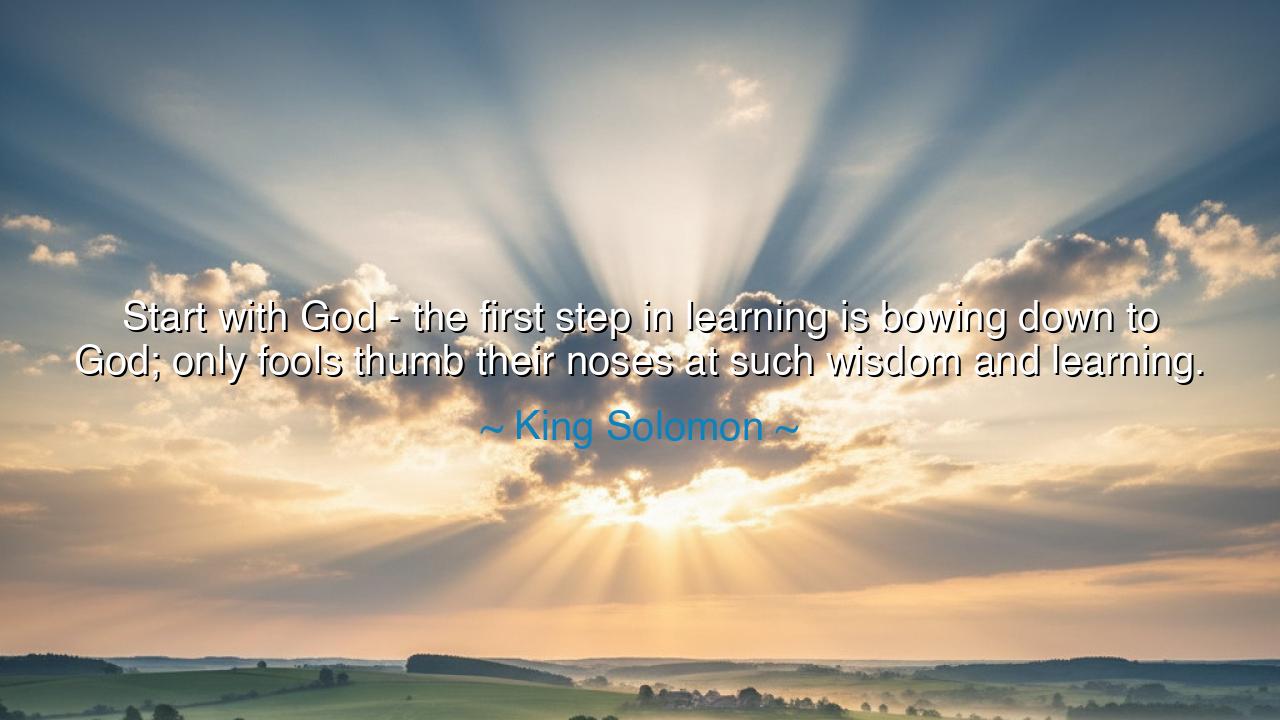
Start with God - the first step in learning is bowing down to
Start with God - the first step in learning is bowing down to God; only fools thumb their noses at such wisdom and learning.






The saying “Start with God — the first step in learning is bowing down to God; only fools thumb their noses at such wisdom and learning” is rooted in the ancient teachings of King Solomon, the son of David, known throughout history as the wisest of men. This quote echoes the timeless verse from the Book of Proverbs: “The fear of the Lord is the beginning of wisdom.” It is not a cry for superstition, nor a command for blind faith, but a declaration that true knowledge begins with humility before the Source of all truth. For Solomon, wisdom was not merely the accumulation of facts or the mastery of laws; it was the alignment of one’s heart with the eternal order established by God.
When Solomon ascended to the throne of Israel, he was young and inexperienced. One night, God appeared to him in a dream and said, “Ask what I shall give thee.” Solomon did not ask for riches, nor for power, nor for the death of his enemies. Instead, he said, “Give thy servant an understanding heart to judge thy people, that I may discern between good and evil.” This prayer of humility pleased God, and Solomon was granted not only wisdom but also honor and prosperity beyond measure. Thus, his reign became the golden age of Israel, and his name a symbol of enlightenment guided by divine understanding. From his life and writings, the principle was born: wisdom begins not in pride, but in reverence.
To “start with God” means to begin every pursuit — whether of learning, ambition, or life itself — from a place of spiritual humility. It is the recognition that all knowledge flows from one fountain, and that no matter how high the intellect ascends, it must first kneel before truth. The “bowing down” is not physical alone; it is the bending of the soul before reality, the acknowledgment that our human understanding is limited, and that beyond our knowing lies an infinite wisdom. To ignore this — to “thumb one’s nose” at the divine order — is the essence of folly. For arrogance blinds the mind as surely as darkness blinds the eye.
Throughout history, those who have achieved greatness in science, art, and philosophy often began with this same reverent awareness. Isaac Newton, the father of modern physics, once said, “I am but a child playing on the seashore, while the great ocean of truth lies undiscovered before me.” Though he mapped the heavens and unlocked the laws of motion, he never claimed ownership of truth — he merely sought to uncover what God had already written into the fabric of creation. His humility before the divine pattern allowed him to see deeper than those who studied only for pride. Thus, like Solomon, Newton embodied the truth that wisdom begins in wonder, and wonder begins in reverence.
To “thumb one’s nose” at divine wisdom is to repeat the error of those who mistake knowledge for wisdom and intelligence for insight. In every age, there are men who glorify their intellect but neglect their spirit, who dissect the world yet fail to grasp its meaning. They may build towers of technology, but their hearts remain barren. Solomon warned that such pride leads to ruin — for without God, learning becomes cleverness without conscience, progress without purpose. The fool’s laughter at sacred things is not freedom but blindness, a denial of the light that makes all seeing possible.
The beauty of Solomon’s teaching lies in its eternal simplicity. It is not a doctrine for priests alone but a compass for every soul that seeks understanding. Whether one studies the stars or the scriptures, the arts or the laws of nations, the first act of wisdom is to acknowledge the Giver of wisdom. This humility opens the mind to true illumination — a wisdom that transcends intellect and touches the heart, guiding one toward justice, compassion, and peace.
The lesson is clear and enduring: do not seek knowledge apart from its Source. Begin each pursuit with prayer, gratitude, and awe. Remember that to bow before God is not weakness but strength, for it aligns the human soul with the rhythm of creation itself.
Practical actions: Before beginning your day, pause and center your heart in humility. Whisper a simple prayer: “Guide me, Lord, in wisdom and truth.” Approach learning with reverence, not vanity. Listen more than you speak. When faced with decisions, ask not merely, “What is smart?” but “What is right?” In all things, start with God, for as Solomon taught, those who begin with reverence will end with understanding, but those who begin with pride will find only emptiness.






AAdministratorAdministrator
Welcome, honored guests. Please leave a comment, we will respond soon